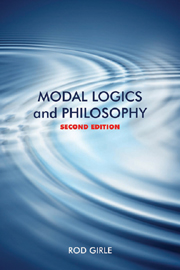Preface
Summary
The second edition was prompted by two things. First there was the feedback from several readers asking for something about conditionals, especially since many modern conditional logics use possible worlds semantics. So there are two new chapters, one in Part 1 presenting the formalities of a range of conditional logics, and one in Part 2 with philosophical discussion of some of the issues raised by conditionals.
Secondly, the use of the volume in teaching has suggested some revisions and corrections and re-ordering of content in the first part of the text.
I wish to thank all those who have sent me comments, questions and corrections.
Preface to the first edition
This text is a second level logic text. It introduces students to modal logic as an extension of classical first-order logic. The emphasis is on introducing the object language and some of the applications of modal logic in philosophy and artificial intelligence.
This text is not intended to be a metatheory text for modal logic. There are several excellent texts in that area. (For example: Brian F. Chellas, Modal Logic: an introduction, Cambridge, London, 1980; and G. E. Hughes and M. J. Cresswell, A New Introduction to Modal Logic, Routledge, London, 1996.) Our main focus will be on presenting the logics at an object language level, with a minimum of metatheory. The emphasis will be on the possible worlds semantics. There will be only a brief mention of axiom systems.
- Type
- Chapter
- Information
- Modal Logics and Philosophy , pp. vi - viiPublisher: Acumen PublishingPrint publication year: 2009



